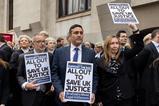High Court backs top silk in multi-million-pound professional negligence claim, ruling that he did not owe a duty of care to third parties
Lawyers may breathe a sigh of relief following the news that a leading tax silk has fought off a multi-million-pound professional negligence claim concerning duties to third parties.
Andrew Thornhill QC, called to the bar in 1969, faced claims from more than 100 investors in three limited liability film distribution partnerships which were marketed as entitling them to tax relief but later shut down by HM Revenue & Customs.
The High Court this week ruled that Thornhill, who advised the schemes’ promoters and not the claimants, did not owe a duty of care: and, even if he did, would not have breached it by providing his opinion that the schemes would achieve tax benefits.
McClean & others v Thornhill is ‘an important illustration that an assumption of responsibility to a third party does not arise simply because advice is shared with that third party, even if the advice concerns the prospective tax position of that third party,’ Thornhill’s solicitor Will Glassey said. Glassey, of Herbert Smith Freehills, added: ‘Where a lawyer advises a tax scheme sponsor about the tax effects of that scheme for potential investors in that scheme, there is an analogy with a valuer who advises a lender about the value of a commercial property. The property may be owned by the borrower, and the valuation might be of great interest to the borrower, but an assumption of legal responsibility by the valuer to the borrower – and, in this case, by the lawyer to the potential investors – requires more.
‘Reliance on the advice must be reasonable and must be reasonably foreseeable by the adviser. Here, the prospective investors were the commercial counterparties to the scheme sponsor, and they had to warrant to the tax scheme sponsor that they had taken their own advice.
‘In those circumstances, it would have been surprising for the sponsor’s own adviser to be said to have owed them a duty of care.’
Thornhill provided advice, which said he had ‘no doubt’ the partnership would generate profits for the promoters of the schemes in the early 2000s. But HMRC refused the tax relief claimed in 2016, causing ‘dire financial consequences’.
The claimants sought to recover their losses from Thornhill, arguing that the schemes were sold to investors on the basis of his ‘unequivocal endorsement’, which was said to have been presented as ‘effectively as good as an advance ruling from HMRC’.
Mr Justice Zacaroli accepted that Thornhill was ‘undoubtedly one of the leading tax QCs in the country at the time’ and that his advice was therefore ‘likely to carry more weight’. But the judge added: ‘It does not follow, however, that he should have reasonably foreseen that investors would rely on his opinion without consulting their own tax adviser.’
He noted that potential investors were ‘clearly advised … to consult their own tax advisers on the tax aspects of the scheme and that no investor could subscribe to the LLP without warranting that he or she had relied only on the advice of or had only consulted with their own professional advisers’. The fact that Thornhill’s advice about whether the LLP was trading was given in unequivocal terms ‘has no relevance to the reasonableness of potential investors ignoring the recommendation... as to them consulting their own tax advisers’, Zacaroli said.
The judge also rejected the contention that no reasonably competent tax QC could have reached the conclusion Thornhill did, saying: ‘It is true that, since the function of the court is, usually at least, to decide the issues placed before it on the basis of the competing arguments made by the parties, it is not sufficient, in seeking to predict how the courts might decide a case in the future, to point to a case which appears to answer the question, without analysing the arguments that were presented to the court.
‘In cases concerned with tax avoidance schemes, that generally means identifying the basis of challenge made by the revenue and the arguments presented by them in support of that challenge. That does not mean, however, that the reasonably competent tax QC is required to anticipate all possible approaches the revenue might take.’
James Le Gallais, a partner at Stewarts who represented the claimants, said his clients are ‘carefully considering their options’. Any appeal will be keenly watched – and not only by tax specialists.





































No comments yet